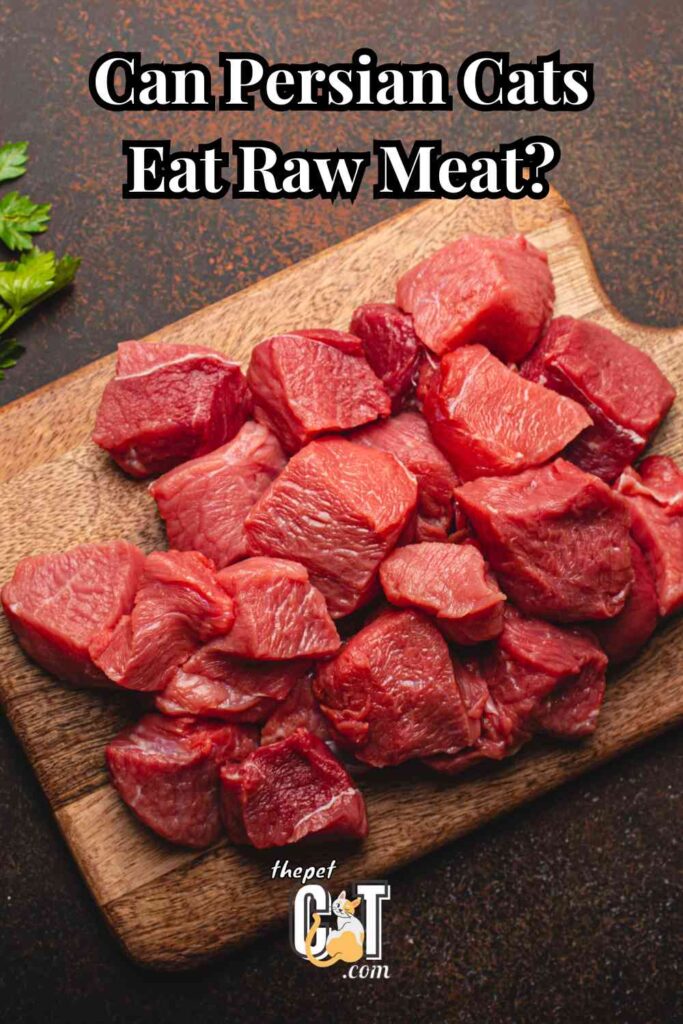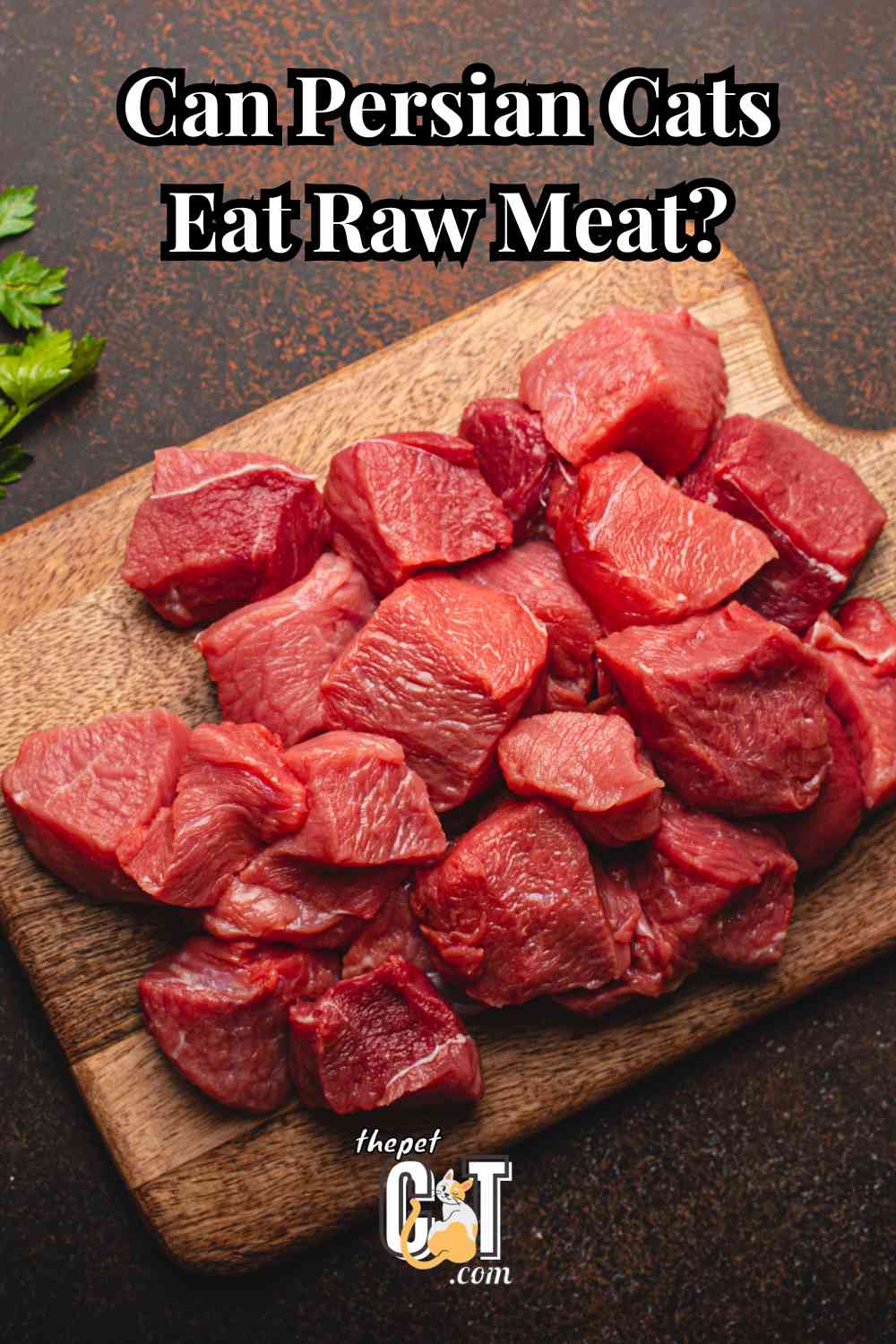Carnivorous cats never step back while they have meat. Meat is their top choice food. Their body and taste both require high protein animal products. In the wild, predator cats hunt prey and enjoy their raw meat.
But there is a question that arises – as house cats are timid and have different environments, and different adaptations, can house cats eat raw meat? This answer comes with significant debate. Some agree that you can feed your cat raw diet/meat. Some may disagree as they may lead bacteria to cats through raw feeding.
However, including other cats, your Persians come from their ancestors. And Their DNA is the same as their parents. So, it’s known that a carnivorous cat’s body is biologically ready to consume raw meat.
So, while you serve raw meat to your Persian, it will surely love it. And raw meat will offer a great amount of protein and essential nutrients.
However, though they will cherish it, you need to consider feeding cats raw meat risks also for their safety. Then, it may assist in making an informed decision.
Read More:

Is Raw Meat Good for Cats? Are There Any Risks?
The Center for Veterinary Medicine (CVM), the Centers for Disease Control and Prevention (CDC), and the US Food and Drug Administration (FDA) are all unitedly discouraged about raw diet feeding because of pathogens and bacteria. But raw diets have significant benefits also. Raw meats have more nutrients than cooked ones. So some consideration can make your path easy.
However, let’s first check the potential risks of feeding cats raw meat. They may guide you to measure how good raw meat is for cats.
1. Parasites and Bacteria
Raw meat may carry dangerous bacteria such as Salmonella and E. coli. They may pose risks of illness for both cats and humans. However, cats have shorter digestive tracts, which reduces the likelihood of illness. But it still poses a risk, especially for cats with weakened immune systems.
2. Nutritional deficiency
Homemade raw chicken diets may lack balanced nutrients. Thus, this may increase the risk of deficiencies. Commercially available raw food options are formulated to meet cats’ nutritional needs and undergo rigorous testing for safety.
3. Bone Hazards
Consuming little bone bits in raw chicken can lead to choking and internal harm. Cooked bones can splinter, posing similar risks. Dental issues may also arise from chewing bones.
4. Cross Contamination Risk
Handling raw meat increases the risk of cross-contamination, potentially affecting both humans and cats.
Proper hygiene measures include cleaning surfaces and washing hands. They are essential to minimize this risk.
5. Nutritional Imbalance
Feeding only raw chicken may cause nutritional imbalances. Consulting with a veterinarian before implementing a raw diet is crucial to ensure cats receive all essential nutrients for optimal health.
How to Feed Raw Food to Persian Cats Safely?
Serving raw foods for Persian cats properly requires several key considerations. Here are:
- Select excellent-quality raw meat from reliable suppliers to reduce the danger of bacterial contamination. You can opt for fresh or reputable frozen raw cat food brands.
- Recent fresh meat is best as time passes, as bacteria contamination increases. Perfectly frozen (O degree) can deactivate such microbes. To store it, you can follow this temperature.
- And while you want to serve, you need to thaw it in the refrigerator. This will prevent rapid bacteria growth. Once thawed, serve the meat promptly. For betterment, you need to avoid refreezing.
- When thawing the frozen meat, do it in the refrigerator. Then, you need to sanitize surfaces to avoid bacterial spread. Additionally, you may need to consider separate cutting boards and utensils to prevent cross-contamination.
- To feed bones, you need to select large, raw bones. They are suitable for chewing. Or you can opt for boneless or ground meats to avoid the risk of bone splinters.
- Introduce raw food to your Persian cat’s diet gradually. This will allow proper time for their digestive system to adjust. Begin with tiny doses and check for any unwanted reactions.
- Consult a veterinarian or specialist to confirm your Persian cat’s raw diet is balanced and meets nutritional requirements. However, you can supplement or use commercial raw cat food brands to ensure complete nutrition.
- Maintain proper hygiene while handling raw meat. After contact, thoroughly clean your hands, utensils, and surfaces with hot, soapy water.
- Supervise your Persian cat during meals, especially when introducing new raw food items or bones. Thus, you can ensure they eat safely and avoid choking hazards.
How Much Raw Food to Feed Cat Calculator
The right way and right portion size can make healthy cat food for Persian cats. You can followa suitable standard rule of thumb for a Raw food calculator cat.
This is to provide about 2% of their total weight in two meals daily. For instance, an average 10-pound cat should consume approximately 3 oz raw food at a single meal. Kittens need to be fed 5–6% of their developing body weight.
However, this is just a general guide to help you to calculate. Some cats may require less or more to maintain an appropriate weight. Experts recommend feeding any 6 months older cats twice a day.
The Raw Meat Benefits for Cats
Though the AVMA, including many sources, discourages raw diet for cats, many sources agree with raw food feeding. But with some conditions, such as properly balanced, fresh, clean, and appropriate amounts. Then, you may get a beneficial bowl of raw food for cats.
Basically, raw meat eating is in their nature. It satisfies their natural predator behavior. A diet similar to what cats would consume in nature has numerous benefits for both you and your cat.
With the above mentioned safety considerations and suitable feeding amounts, your Persian may get some incredible benefits.
- Healthier digestion
- Increased energy
- Healthy coat, reduced shedding, and fewer hairballs
- Significantly reduced poo odor and volume.
- Lose weight if your cat is overweight.
- Improved urinary health.
- Enhanced dental health.
Note: for its betterment, you need to feed such a diet after 20 weeks of age.
What Raw Meat Can Cats Eat?
If you are stuck with What raw meat can I feed my cat? Can Persian cats eat chicken? Or can cats eat raw beef? Check the list below at a glance. Here’s a basic overview of raw meat options for cats.
| Raw Meat Source | Nutrients | Benefits for Cats | Portion and serving idea |
| Chicken | protein, vital amino acids, and taurine. | healthy skin, muscles, and coat. | Offer 10-15 % as tiny cubes or shredded. |
| Beef | protein, iron, and B vitamins. | muscle development and overall health. | 2-3 Thin slices |
| Lamb | B-group vitamins and zinc | Supports nervous system function and immune health. | 1-2 tablespoon minced meat |
| Duck | protein, Omega-3 fatty acids, and vital minerals. | Promotes skin and coat health and boosts the immune system. | 1-2 tablespoons of diced cubes or shredded meat |
| Turkey | protein, taurine, and Omega-3 fatty acids. | assists heart health and immune function. | 1-2 tablespoons of ground meat |
| Rabbit | Low in fat, high in protein, and essential amino acids. | Promotes lean muscle development and energy. | 2-3 small pieces |
You can offer raw bones occasionally as treats. Choose large, raw bones like chicken or turkey necks.
Supervise your cat while chewing to prevent accidents. Alternatively, you can grind bones and mix them with meat for safe consumption. Always consult a vet before adding bones to your cat’s diet.
Note: Rather than only meat, a mixed diet of meat and bones can be more beneficial. Bones work well as a great calcium source.
Raw Meat Alternative for Cats
Several options ensure a safe and balanced diet when considering alternatives to raw meat for cats. Below are raw meat alternative food of persian cats.
Commercial Wet or Dry Cat Food
Reputable brands offer specially formulated meals tailored to cats’ nutritional needs, providing essential nutrients in processed forms.
Fresh Food Diet
Choose fresh, unprocessed items such as cooked meats, veggies, and grains. Homemade meals or commercially prepared fresh food options can provide variety and nutrients.
Canned Food
Convenient and nutritious, canned food offers moisture and various flavors that can complement a cat’s diet when mixed with dry or fresh food.
Cooked Meats
Cooked chicken, turkey, or beef can be a safe alternative to raw meat, providing protein and nutrients without the risks of raw feeding.
Freeze-Dried or Dehydrated Foods
These options offer the nutritional benefits of raw meat in a convenient, shelf-stable form, making them easy to store and serve.
Is Raw Food or Cooked Food Better for Cats?
Both raw and cooked homemade meals can be good for cats. Raw diets mimic what cats eat in the wild, providing important nutrients. However, many sources discourage it because of the risk of bacteria. But proper handling and fresh quality can be a savior. Cooked homemade meals are made with quality ingredients. They are also better than processed commercial foods.
FAQs
Can Persian Cats Eat Cheese?
Yes, Persian cats eat cheese, but in moderation. According to experts, little bites do not significantly harm your fury. Read more:
Is It Healthy for Cats to Eat Only Meat?
No, it is not healthy for cats to eat only meat. Organs and bones contain essential nutrients like calcium needed for skeletal health. A balanced diet with organs and bones is essential for a cat’s general health. You need to avoid feeding cats a meat-only diet. Also include other nutrient sources.
Do Cats Go Blind if They Don’t Eat Meat?
Yes, cats can go blind if they don’t eat meat. As obligate carnivores, they require nutrients like taurine. This component is found in meat, which is essential for eye health. A taurine deficiency can lead to vision problems and eventual blindness. Therefore, a meat-inclusive diet is essential to maintain their overall health and eyesight.
Final Verdict
Can persian cats eat raw meat? While raw meat is a natural choice for Persian cats due to their predatory nature, it’s essential to consider the associated risks and safety measures.
Whether raw or cooked, balanced diets ensure your cat receives essential nutrients. Consult a veterinarian to tailor a diet suitable for your cat’s needs. Ultimately, prioritize your cat’s health and well-being when deciding on their diet.
You May Also Like to Read:

